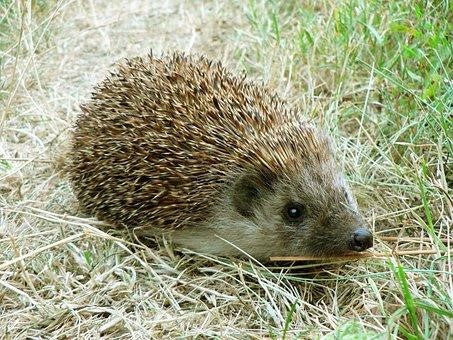
Hedgehogs typically consume a variety of insects as well as some plants. Despite being omnivores, they primarily consume insects for food. Large hedgehogs occasionally eat meat, typically in the form of young mammals like mice. This is unusual, though, and would only happen if they happened to stumble upon them in the wild. The primary food source for domestic hedgehogs should be a range of various insects.
To make sure the hedgehog is getting adequate vitamins, these insects should ideally have to be offered with essential vegetables. If not, deficits could develop or a hedgehog might require a supplement. Worms and crickets are popular choices of insects. Insects meant for hedgehogs should be purchased at pet retailers. Wild-caught insects are not recommended because they could include fertilizers and insecticides that are harmful to hedgehogs. In addition, a lot of them contain parasites that can spread to a hedgehog if consumed.
CAN HEDGEHOGS EAT GRASS?
No, hedgehogs cannot eat grass. Due to the difficulty in digesting grass, consuming grass could result in digestive issues for hedgehogs because they lack the digestive enzymes and stomach configuration required to digest grass, unlike some other mammals. As a result, consuming grass may result in severe health problems for hedgehogs. Additionally, a hedgehog could be harmed by the chemicals and fertilizers that are likely present in grass. Even if the grass that is cultivated and meant for consumption won't include these fertilizers and chemicals, a hedgehog still shouldn't eat it to prevent digestive issues.

WHY CAN HEDGEHOGS NOT EAT GRASS?
Grasses are not a natural component of a hedgehog's diet. It is challenging for hedgehogs to eat and does not contain sufficient nutrients thus, hedgehogs probably won't benefit much from eating grass as a result. Grass can also cause impaction, which is a clogged intestinal system in hedgehogs. To eliminate the obstruction resulting from impaction, surgery is frequently needed. Fortunately, this only has a chance of happening if a hedgehog eats a lot of grass.
Even though grass doesn't pose any health risks in little quantities, it is still preferable for a hedgehog to eat something else to fill its stomach. Grass acts mostly as food fillers for hedgehogs, thereby causing their inability to consume much of any other food that might be rich in nutrients, which could result in nutritional deficits.
There is always a chance that a hedgehog might curiously eat some grass just to explore what it tastes like. Even though a single nibble of a blade of grass is unlikely to cause long-term harm, it is not advisable to intentionally provide grass to hedgehogs of any species, because it is not part of their normal diet.
Furthermore, their bodies and teeth have not developed to eat grass. For hedgehogs, eating grass can have serious health consequences. Their digestive systems are deficient in the proper enzymes needed to convert grass into nutrients that the body can use. Hedgehogs often require the right nutrients, which are not present in grass.

WHAT FOODS CAN HEDGEHOGS EAT?
As a result of their consumption of a variety of foods, including certain plants and small animals, hedgehogs are also known as omnivores. However, African Pygmy hedgehogs are the most popular variety kept as pets. Because of their special capacity to digest chitin derived from insect exoskeletons, hedgehogs are known to primarily eat insects. A hedgehog receives fiber and protein from the chitin derived from its consumption of insects.
Hedgehogs can be fed other appropriate diets besides cat food, which some owners often feed their hedgehogs. They can be provided with additional foods, such as:
Mealworms
They are an excellent source of chitin, whether they are live or freeze-dried. Hedgehogs are given live mealworms for mental stimulation. This is significant because grasping moving worms requires hedgehogs to concentrate and exert mental effort.
Crickets
Crickets are a fantastic source of nutrition and cerebral stimulation. Hedgehogs can either be given freeze-dried or live crickets. It is advisable to gut-load these insects before giving them to a hedgehog, to enable it to obtain the adequate nutrients needed.
Fruits
It's okay to occasionally give a hedgehog fruit as a treat, but hedgehogs should not consume dried fruits or citrus fruits (of any type). Fruits that can be offered to hedgehogs in modest amounts include bananas, berries, melons, and apples.
Vegetables
In general, hedgehogs may consume vegetables such as cooked tomatoes, green beans, and squash. However, it is not advisable to offer them any starchy veggies, such as corn, potatoes, or dried vegetables, like carrots.
Hedgehogs have the propensity to overeat, so it is recommended to carefully watch what they eat. Overeating can result in obesity for hedgehogs, just like in all animals. A hedgehog may feel unwell and experience other health issues if they become overweight. Foods meant for hedgehogs should always be given in exact measurements to keep a close eye on their weight. It is also important to avoid vegetables like lettuce and celery that are high in water content but low in nutrients. In addition, some fruits and vegetables, such as avocados, are poisonous to hedgehogs.
WHAT FOODS CAN HEDGEHOGS NOT EAT?
One misunderstanding about feeding hedgehogs is that most hedgehog owners believe that milk and bread are healthy options for hedgehogs. Hedgehogs are lactose intolerant, which causes them to become unwell from consuming milk, and they could experience difficulties digesting bread. Also, offering milk and bread to hedgehogs provides them with less nourishment as well. In addition to these, to keep hedgehogs healthy and happy, they should not be fed unhealthy foods like nuts, seeds, grapes, raisins, onions, garlic, mushrooms, citrus fruits, avocados, chocolates, fatty or high-fat meats, raw meats, and processed meals.
CONCLUSION.
Hedgehogs mostly eat insects, however, they will occasionally consume small amounts of plant-based food. Hedgehogs can be given other foods besides hedgehog food or cat food, such as broccoli, carrots, leafy greens, cucumber, or even peas. Hedgehogs can't consume or digest grass well. Even while consuming a modest bit of grass may not be harmful, their stomachs may have a difficult time breaking it down and absorbing it. In addition, it has been established that the poisonous fertilizers and pesticides sprayed on grass are fatal to the health of hedgehogs, so they should not consume grass even in small amounts.



